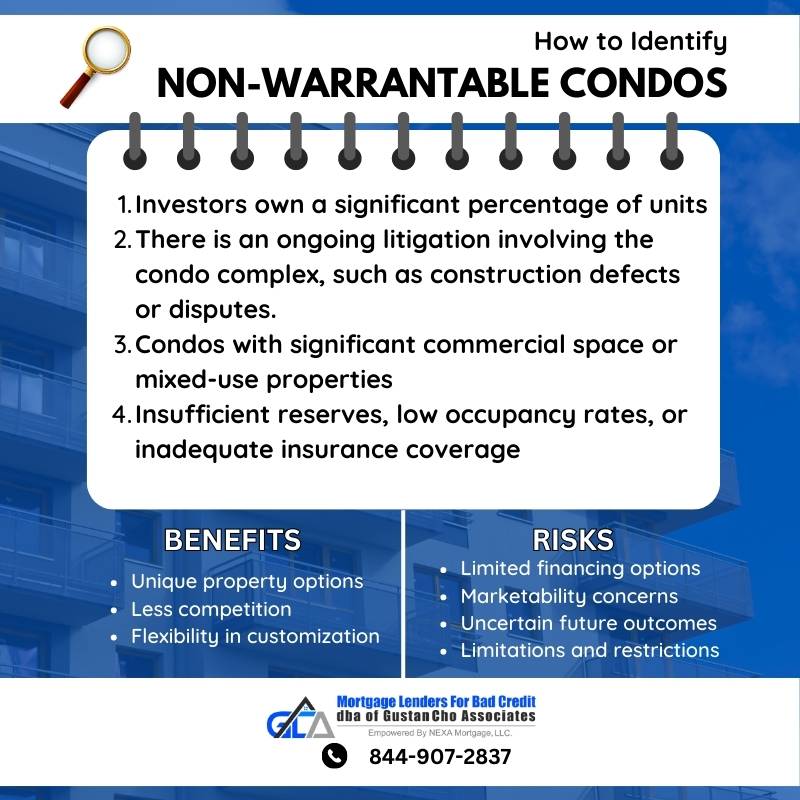Non-Warrantable Condos
This guide covers navigating financing for unique Non-Warrantable Condos. There are two types of condominium loans: Warrantable and non-warrantable condos. Non-Warrantable Condos present a unique and intriguing option for homeownership, but they also come with challenges when securing financing. These types of condominiums, which do not meet the eligibility criteria set by traditional lenders, require specialized approaches for financing.
Understanding what Non-Warrantable Condos are and how to navigate their financing is crucial for prospective buyers looking to embrace this unconventional homeownership opportunity. In this article, we will explore the concept of Non-Warrantable Condos, delve into the criteria that classify them as such, and examine the challenges and considerations associated with their financing.
We will also highlight the available financing options, eligibility requirements, and strategies for successfully financing Non-Warrantable Condos. By equipping yourself with knowledge and guidance, you can confidently navigate the intricacies of Non-Warrantable Condo ownership and make informed decisions on your path to unique homeownership. We will be comparing warrantable versus non-warrantable condos.
Definition and Characteristics of Non-Warrantable Condos
Non-Warrantable Condos are properties that do not meet the eligibility requirements set by conventional loan programs and government-sponsored enterprises like Fannie Mae and Freddie Mac. These condos often deviate from the standard guidelines for various reasons, such as the complex legal structure, ownership concentration, pending litigation, or inadequate financial reserves.
Non-Warrantable Condos can include unique properties like mixed-use buildings, condotels, or condominiums with commercial spaces. Financing Non-Warrantable Condos presents specific challenges for potential buyers. Traditional lenders are typically more cautious when extending loans for these properties due to the increased risks associated with their unique characteristics. Financing for Non-Warrantable Condos may require alternative financing options, specialized lenders, or higher down payments.
Buyers should also consider potential limitations on loan amounts, higher interest rates, and additional documentation requirements. Understanding the concept of Non-Warrantable Condos is vital for prospective buyers as it enables them to navigate the complexities of financing these unique properties. By being aware of the challenges and considerations, buyers can make informed decisions, explore suitable financing options, and set realistic expectations regarding loan terms and requirements.
Criteria for Classifying a Condo as Non-Warrantable
Several criteria are considered when classifying a condo as non-warrantable. These criteria can vary among lenders, but common factors include if investors rather than owner-occupants own a significant percentage of units, it may render the condo non-warrantable. Delinquent HOA dues: Non-payment or high delinquency rates of homeowners association (HOA) dues can impact a condo’s warrant ability.
Ongoing litigation involving the condo complex, such as construction defects or disputes, can lead to non-warrantable classification. Commercial space: Condos with significant commercial space or mixed-use properties may be deemed non-warrantable.
Insufficient reserves, low occupancy rates, or inadequate insurance coverage can contribute to a condo’s non-warrantable status. Various factors can contribute to a condo being classified as non-warrantable. Additionally, understanding the distinction between Warrantable and Non-Warrantable Condos empowers buyers to assess their affordability and evaluate the long-term financial implications of homeownership in these non-traditional condominiums.
Non-compliance with investor concentration limits set by lenders
Insufficient financial documentation or incomplete financial records provided by the HOA. Pending or recent construction or renovation work that does not meet lender requirements. Legal restrictions, such as rental restrictions or short-term rental bans. Deficiencies in the condo associations’ budget, governance, or insurance coverage.
Lenders are crucial in determining whether a condo is warrantable or non-warrantable. They assess the condo’s compliance with their specific guidelines and evaluate the associated risks. Lenders review the condos’ legal and financial status, HOA documentation, and overall marketability.
Based on these evaluations, lenders decide whether to offer conventional financing options or if alternative financing approaches are necessary. Lenders’ requirements and thresholds for warrant ability can vary, so it is essential for buyers to work with experienced mortgage professionals familiar with Non-Warrantable Condos and lender guidelines.
Financing Options for Non-Warrantable Condos
Traditional lenders’ approach to Non-Warrantable Condos: Traditional lenders generally have stricter guidelines for financing Non-Warrantable Condos due to the increased risks associated with these properties. They may require a higher down payment, stricter credit score requirements, and additional documentation to mitigate these risks. However, some traditional lenders may still consider financing Non-Warrantable Condos on a case-by-case basis, particularly if the property meets certain criteria or if the
the borrower has strong financial qualifications.
Non-warrantable condos are properties that do not meet the eligibility criteria set by Fannie Mae and Freddie Mac, the government-sponsored enterprises (GSEs) that provide liquidity to the mortgage market. These condos may have characteristics that make them ineligible, such as excessive investor ownership, litigation, or insufficient reserves.
Traditional lenders, such as banks and credit unions, typically follow the guidelines set by the GSEs when approving mortgage loans. Due to the increased risk associated with non-warrantable condos, these lenders may be reluctant to finance such properties. They prefer lending on condos that meet the standard criteria to minimize their risk exposure.
Alternative financing solutions for Non-Warrantable Condos
If you have a non-warrantable condo, your options with traditional lenders may be limited. You may need to explore alternative financing solutions to secure a mortgage for your property. Alternative financing solutions may be available for buyers who face challenges securing financing from traditional lenders.
Alternative financing solutions often provide more flexibility regarding borrower qualifications, property types, and unique circumstances. These options can include portfolio loans held by the lender instead of being sold on the secondary market or non-Qualified Mortgage (non-QM) loans catering to borrowers who don’t meet the standard underwriting criteria.
Portfolio lenders are financial institutions that keep mortgages in their portfolios instead of selling them to the secondary market. They have more flexibility in underwriting and can consider non-warrantable condos on a case-by-case basis. Rather than relying solely on standard eligibility criteria, these lenders focus more on the borrower's overall financial profile and the property’s value.
Non-Qualified Mortgage (Non-QM) Loans
Non-QM loans don’t meet the qualified mortgage standards defined by the Consumer Financial Protection Bureau (CFPB). Specialized lenders willing to take on riskier borrowers or properties offer these loans. Non-QM loans may have different requirements, such as higher down payments, interest rates, or alternative income verification methods.
Private lenders, including individuals or private investment groups, can be an option for financing non-warrantable condos. These lenders are not subject to the same regulations as traditional lenders and may be more willing to provide financing for unique or non-conforming properties. Private lenders often consider the property’s value, the borrowers’ creditworthiness, and the loan-to-value ratio.
Specialized lenders and programs catering to Non-Warrantable Condo financing: Certain lenders specialize in providing financing tailored to Non-Warrantable Condos. These lenders have a deeper understanding of the complexities and risks associated with these properties. They offer specialized programs that cater to borrowers seeking to purchase or refinance Non-Warrantable Condos. These lenders often have established relationships with specific condo developments and can provide more personalized financing options and guidance throughout the process.
Condo-Specific Lenders
Some lenders specialize in financing non-warrantable condos and have programs tailored to meet the unique needs of condo buyers. These lenders have extensive experience with non-warrantable properties and understand the associated risks. They may offer flexible underwriting guidelines and competitive loan terms for non-warrantable condos.
Government-sponsored programs like the Federal Housing Administration (FHA) or the Department of Veterans Affairs (VA) does not provide financing options for non-warrantable condos. These programs have their eligibility criteria, and the property must meet certain standards. However, availability and terms may vary, so checking with the respective agencies for specific guidelines is important.
Non-warrantable condos may include cooperative housing units where residents own shares in a cooperative corporation rather than individually owning the property. Cooperative lenders specialize in financing these properties and have a deeper understanding of their unique structures and financing requirements. Researching and consulting with different lenders and mortgage professionals is essential to explore financing options for non-warrantable condos. Each lender may have specific requirements and terms, so comparing offers will help you find the most suitable financing solution for your situation.

Eligibility and Qualification for Non-Warrantable Condo Loans
Criteria for borrowers seeking financing for Non-Warrantable Condos. Borrowers’ credit history is important factor lenders consider. While requirements may vary, a good credit score (typically 620 or higher) is generally necessary to qualify for financing. Lenders may also consider factors like payment history, outstanding debts, and derogatory marks on the credit report.
Lenders assess borrowers’ income and employment stability to ensure they have the financial capacity to repay the loan. Generally, borrowers must provide proof of steady income through documents such as pay stubs, W-2 forms, or tax returns. Self-employed individuals may need additional documentation, such as profit and loss statements or business tax returns.
The DTI ratio compares borrowers’ monthly debt obligations to their gross monthly income. Lenders typically have maximum DTI ratio requirements, including the proposed mortgage payment and other debts like credit card payments, car loans, and student loans. A lower DTI ratio indicates a borrower’s ability to handle additional debt and is preferable for loan approval. Lenders may require a larger down payment for non-warrantable condos than traditional ones. The exact amount can vary, but lenders commonly request a down payment of 20% or more. A higher down payment demonstrates a borrower’s commitment and lowers the loan-to-value (LTV) ratio, reducing the lender’s risk.
Required documentation and verification process
Identification and Personal Information: Borrowers must provide identification documents such as a driver's license or passport. They must also provide personal information, including their Social Security number and contact details.
- Financial Documents-Lenders require various documents to verify income, assets, and debts. These may include recent pay stubs, W-2 forms, tax returns, bank statements, investment account statements, and other assets or liabilities documentation.
- Condo Documentation-Borrowers must provide information about the non-warrantable condo, including the property address, HOA (Homeowners Association) contact information, and any relevant condo association documents. Lenders may also request a condo questionnaire or review the HOAs financials and bylaws to assess the property’s financial health.
- Considerations for credit scores, income, and debt-to-income ratio-Credit Scores: A higher credit score increases the chances of approval and may result in more favorable loan terms. Lenders generally expect a credit score of 620 or above, but some may have higher requirements. Borrowers with lower credit scores may still be eligible for financing but may face higher interest rates or additional requirements.
- Income-Lenders evaluate borrowers’ income to ensure they can afford the mortgage payments. Steady employment and consistent income history are typically preferred. Borrowers with variable income, such as self-employed individuals, may need additional documentation to demonstrate income stability.
- Debt-to-Income Ratio (DTI)-Lenders analyze the DTI ratio to assess borrower’s ability to manage debt. A lower DTI ratio is generally more favorable and indicates a lower financial risk. Lenders typically have maximum DTI ratio limits, often around 43% to 50%, although some specialized lenders may allow higher ratios.
It’s important to note that specific eligibility criteria and requirements may vary among lenders and loan programs. It’s advisable to consult with mortgage professionals or loan officers who specialize in non-warrantable condo financing to understand the specific qualification guidelines and documentation needed for your situation.
Benefits and Risks of Non-Warrantable Condo Ownership
This section will discuss the potential advantages of owning a Non-Warrantable Condo. Most non-warrantable condos are beachfront or waterfront properties.
- Unique property options-Non-Warrantable Condos offer a diverse range of properties, including mixed-use buildings or condos with commercial spaces, which can provide a distinctive living or investment experience.
- Less competition – Due to the stricter financing requirements, Non-Warrantable Condos may have fewer potential buyers, resulting in potentially lower purchase prices and less competition in the market.
- Flexibility in customization-Non-Warrantable Condo owners often has more flexibility in customizing their units than properties governed by stricter HOA regulations—unique challenges and risks associated with Non-Warrantable Condos.
- Limited financing options-Non-Warrantable Condos may have fewer financing options, making it more challenging to secure a mortgage. This can lead to higher down payment requirements, stricter qualification criteria, or potentially higher interest rates.
- Marketability concerns-Reselling a Non-Warrantable Condo may present challenges, as the pool of potential buyers may be smaller due to financing restrictions. This can impact the property’s marketability and potentially affect its resale value.
- Uncertain future outcomes-Non-Warrantable Condos may be subject to ongoing legal issues, construction defects, or changes in zoning regulations that could affect the property’s desirability, livability, or future value. Non-Warrantable Condo owners must carefully review and understand the specific homeowner association (HOA) requirements and restrictions associated with their property. These can include rules regarding property usage, rental restrictions, pet policies, and renovation.
- Limitations and more – Complying with these regulations is crucial to ensure a harmonious living environment and avoid potential penalties or disputes with the HOA. By considering the potential advantages of Non-Warrantable Condo ownership, being aware of the unique challenges and risks associated with these properties, and understanding the HOA requirements and restrictions, prospective buyers can make informed decisions and mitigate potential pitfalls.
It is important to assess the financial implications thoroughly, weigh the pros and cons, and seek professional guidance to ensure a successful and rewarding Non-Warrantable Condo ownership experience.
Strategies for Successfully Financing Non-Warrantable Condos
Consulting a real estate agent or mortgage broker specializing in Non-Warrantable Condos can be instrumental in navigating the financing process. They have the expertise and industry connections to identify lenders with experience financing these properties. Their knowledge
can help streamline the search for suitable financing options and ensure compliance with lender requirements.
Before pursuing financing for a Non-Warrantable Condo, conducting thorough due diligence on the condo association is essential. Review the associations financial statements, bylaws, meeting minutes, and ongoing or past litigation.
Understanding the condo association’s financial stability, governance, and potential risks can help identify red flags and make an informed decision regarding the property’s financing feasibility. To increase the chances of securing financing for a Non-Warrantable Condo, borrowers should also focus on building a strong financial profile. This includes maintaining a good credit score, reducing debts, and having sufficient income to repay loans. Additionally, addressing potential risks associated with the property, such as litigation, delinquent HOA dues, or investor concentration, can enhance the borrower’s eligibility for financing and mitigate lender concerns.
Are Non-warrantable condos good investments
In conclusion, financing a Non-Warrantable Condo presents unique challenges and considerations for prospective buyers. Understanding the criteria for classifying a condo as non-warrantable, exploring financing options tailored to these properties, and being aware of the benefits and risks associated with Non-Warrantable Condo ownership is essential. Engaging knowledgeable professionals, conducting thorough due diligence, and building a strong financial profile can greatly increase the chances of successfully obtaining financing for a Non-Warrantable Condo. By following these strategies, buyers can confidently navigate the process and make informed decisions to achieve their real estate goals.







